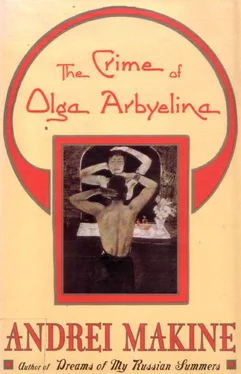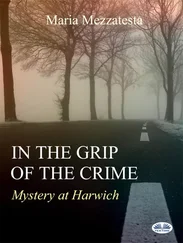He arrived in Paris after the revolution and spent a terrible year reduced to begging; painting his toenails with India ink to camouflage the holes in his shoes; and a prey at night to the hallucinations of a starving man. His only fortune consisted of the deeds to several estates long since confiscated by the new regime. To his great surprise he found a buyer one day, someone who believed that a return to the old order in Russia was quite likely. So Khodorsky began seeking out from his compatriots deeds that were at once worthless and valuable. The purchasers, impressed by the imperial two-headed eagles and attracted by the derisory prices, easily allowed themselves to be persuaded. The count secured several years of riotous living for himself. But in time as the rich seam became exhausted, one day he had to put up for sale a very modest country house, the family home where he had spent his childhood. The purchaser, suspicious, examined the papers for a long time, asked for more details. Khodorsky, with a painfully forced smile, praised the lands that surrounded the house, the little river with its white sand, the orchard where nightingales sang. He even showed a photograph, the only snapshot left to him from his youth. In it you could see a farm cart near the front steps, and a child holding out a wisp of hay to the horse, while gazing fixedly at the photographer… This snapshot seemed to be the deciding factor. As was his habit, Khodorsky celebrated his temporary enrichment in a restaurant in the Passy district. His guests found him true to himself: brilliant, extravagant, able to take part in several conversations at the same time. The next day toward noon, one of them who called on the count discovered him lying in his best apparel, his head stuck to a pillow heavy with blood…
The two visitors seem to pay little attention to the vicissitudes of these tales of broken lives. As if, without knowing the facts, they have already foreseen their endings, each as logical as it was absurd. Only certain details arouse their interest; it is hard to know why. They have just looked quickly at each other; both were struck by the presence on the suicide's nightstand of the photograph of the wooden house, the horse and cart, and the child-that mysterious being, almost frightening in his ignorance of the future. Yes, their glances almost met, then at once turned away impersonally, seeking no one's eye. They are watching more than listening. The sky is cut in two-to the west the cold crimson of the setting sun and in the other half a low, gray canopy of cloud, gradually spreading and spilling out sparkling hail, whose needle points sting the cheeks and fill the dead leaves with a dry whispering in the paths between the tombstones. And when this dark canopy furls back, the vivid coppery light gilds the brown earth and the tree roots and glints on the puddles-mirrors half buried here and there in the thickets of the shrubbery. A gust of wind, as cutting as a steel wire, assails the eyes with fragments of tears. The old man leans forward, picks up a ceramic urn that holds a long, dry chrysanthemum stem, and puts it back on the gravestone.
His voice begins again, calm and detached; a voice, it seems to the two tardy visitors, that seeks neither to persuade nor to prove. A voice quite different from the incessant hubbub of words that fills their minds; words that, in their daily lives, assault them, solicit them, and demand their allegiance, in an everlasting verbal hash made up of snatches from newspapers and items intoned by newscasters. Words that kill the rare moments of silence within them.
Moreover, the old keeper's tales are barely sketched in. It is in the visitors' minds that the words tell a story, become theater. "A certain adventurer used to sell noble estates," is what he said. "Yes, houses of cards… One day it was the turn of his boyhood home. And in the small hours, he blew his brains out…" Before the next slab exactly the same tone of voice. "You see this mistake here. It withstands time well. 'Cavallry officer'. With two Ts. It's a good thing not everyone can read Cyrillic script. Cavalry officer… Very talkative, always getting carried away. And always the same stories of fighting; decapitating reds with his saber. And the more he told his tales the better he got at imitating that short hiss when the blade slices into the neck and breaks the bones. 'S-s-shlim!' he would hiss. You could really see a head rolling in the grass… When he grew old his face was paralyzed and he couldn't talk anymore. The only thing he could still get out was that 's-s-shlim!' He died in the spring. It was a warm night, they opened the window. Just before the end he pulled himself up on one elbow took a breath with all the strength of his trembling lungs, and whispered, very distincdy, 'Lilac
The young woman listening to the old man could well be one of those women of whom people say, as they approach forty: She's made it. A woman who finds herself one Sunday in winter confronting emptiness and despair so great that death suddenly seems like an invitation secretly longed for… That morning she had begun to leaf through her address book. Her fingers slid over the pages, as if on ice, without being able to get a grip. A whole crowd and at the same time no one. Then finally a name that reminded her of a promise made at least ten years before: "You'll see, it's not like a cemetery at all; it's a real garden, run a little wild; where you get the feeling right away that they have quite a different concept of death from us…" In all of ten years she has not had a single moment free to go there.
The other visitor, the man in a dark blue overcoat with the collar turned up, showing the gleam of his shirt and the knot in his tie, this man, too, has heard of "the garden where you discover a different view of death." He has the look of someone who, half an hour before the family lunch, a gathering of a dozen relatives, gets up, dresses in haste as if he were on the run, and slips out without telling a soul, something he has never done before. The vision he is running away from is of the eyes, the mouths, the faces about to surround him, making the same grimaces, uttering the same remarks as last time, chewing, swallowing. He would have had to reply to them, smile. And, above all, to accept that he was happy because other people considered he had every reason to be happy: the blonde, sleek serenity of his wife; the feline grace of his two daughters, about whom the family banter would be repeated once more-"two beautiful girls, ready to be wed"; and the laden table, facing a bay window, through which, from this sixteenth story, you can study the topography of Paris, as if on a map; and his office located in the same apartment building, which will, by tradition, prompt a gruff observation from one relative ("some people have all the luck; they only have to cross the landing to go to work!")… This man has pictured all the small blessings whose sum total is supposed to make him happy. A great panic has overtaken him. He has seized his coat, closed the door behind him, trying to avoid slamming it, and rushed toward the staircase, dreading that he might encounter the first of the guests outside the elevator…
The old man picks up an armful of dead branches and adds it to a pile of leaves and dry stalks at the foot of a tree. The man and the woman listen to his slow footsteps on the gravel, louder on account of the cold and the silence. So all of this has always been here, they think. This life so different from theirs, a life filled with this calm, with actions that leave them time to notice the imperceptible fading of the light-coppery, pink, now mauve-and to watch it as their own musings ripple past. To let one's gaze roam amid the etched branches against the frozen sky, to sense, without really understanding it, that these moments are mysteriously significant and that even a distracted glance at the little tuft of grass between the stones of the old wall is a necessary part of this day's end, of its light, of its sky, of its unique life. And so intense is the sensation of already belonging to this life that they both resolve, in their own way, to engage in conversation with the keeper at the end of his tale. Indeed his voice seems slightly changed, less impersonal, taking account of their presence before this tombstone.
Читать дальше












